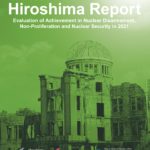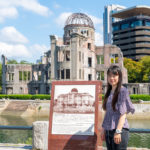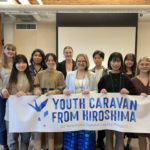Hiroshima Report 2023Column 4 The Nuclear Issue in 2022 from the Young Generation’s Perspective
Suzuka Nakamura
The year 2022 was the most emotionally turbulent year in my life. It has been seven years since I first embarked on nuclear abolition activism as a high school freshman, but never before have I raised my voice with such a mixture of despair and hope.
On February 24, as Russia launched its invasion of Ukraine, President Vladimir Putin made statements threatening the use of nuclear weapons. For the first time in my life, I was forced to confront the immediate threat of nuclear weapons. Although I had learned about the horrors of nuclear weapons and did my part to conveyed them to society, I had not yet realistically considered the actual possibility of nuclear weapons being used in this world that I live in.
I am sure that in that moment, many people around the world felt the same fear as I did. Gradually, however, this feeling transformed into a tension that fueled people’s sense of crisis, sparking discussions of military expansion and nuclear sharing. Some politicians even took the initiative to encourage these discussions, which led to the further propagation of false perceptions and speculation on such matters. Although there were voices in the media saying that Japan should prepare for a Taiwan contingency, I was doubtful about how much this was related to the invasion of Ukraine. As the situation progressed, little by little, voices calling for an end to war or the abolition of nuclear weapons began to be labeled as unrealistic by society as a whole.
Faced with these circumstances, my friends and I grew increasingly disheartened. We spent more time questioning what our activities even meant, and were at a loss as to how to put our beliefs and hopes into words.
At such a time, the First Meeting of States Parties to the Treaty on the Prohibition of Nuclear Weapons (TPNW)—which had been postponed due to the global COVID-19 pandemic—was announced to be held in Vienna in June 2022, and people around the world who supported the treaty started taking the lead on the direction of nuclear disarmament. Despite the Japanese government’s decision to abstain from participating in the conference, I and other citizens of Japan who are involved in nuclear abolition activism traveled to the conference.
Surrounded by people from around the world who are playing a role in nuclear disarmament, I was instilled with a strong sense of hope, a far cry from the despair I had felt in Japan. People listened to and accommodated the voices of concerned parties such as atomic bomb survivors, as well as young people who were unlikely to participate in the decision-making process. This, in my eyes, was a sign of respect toward individual dignity, which is so often overshadowed by the phrase “national security”. In fact, the Action Plan adopted in the conference included active engagement and consultation with concerned parties at all stages of victim assistance, as well as environmental restoration with regard to Articles 6 and 7 of the treaty. It can be said that the TPNW framework has laid the groundwork for each country to recognize people’s individual pain and prioritize the humanitarian aspects of nuclear prohibition. It is my sincere hope that the foundation laid by the TPNW framework leads to further discussions on international security issues among nations such as Japan and nuclear-weapon states.
Outside the TPNW, I still welcome discussions among nations within the framework of the United Nations and the Treaty on the Non-Proliferation of Nuclear Weapons (NPT). However, it is undeniable that conventional frameworks—along with the UN Security Council—have become dysfunctional, as we have seen with the August 2022 NPT Review Conference being unable to adopt a final document due to Russia’s opposition. The Ukraine crisis has no end in sight, and moves to prepare for war through the drastically increase of military budgets, as Japan has done, have prolonged an unsettling atmosphere in society. What kind of year 2023 will be depends on the choices each of us makes. To protect myself, my family, and loved ones around me from harm, I will not compromise in seeking a safe world that is not terrorized by nuclear or armed threats.
Suzuka Nakamura: Co-Founder, KNOW NUKES TOKYO







